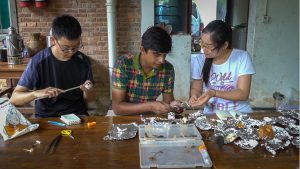By Andrew Stevenson, originally published at ICRAF’s Agroforestry World Blog
We are only just beginning to realise how much life on earth depends on the partnership between fungi and forests. A recent video, released to mark the International Day of Forests on 21 March highlights new research into fungi in the Mekong region, including how local communities can benefit from harvesting and cultivating mushrooms – and how these benefits are linked to protecting forests.
Most people would agree that forests are a vital part of a healthy planet: around 1.6 billion people directly depend on forests for their livelihoods, and forest trees help provide us with healthy soils, clean water and even breathable air. The role of fungi is less well known. Yet without fungi, forests would not exist. In fact, without fungi, it’s unlikely that there would be much life on land at all – over 500 million years ago, it was a partnership between fungi and plants that allowed marine plants to colonize the land. Today, fungi continue to help forests grow by supplying trees with nutrients and breaking down organic matter.

Fungi are also a vital source of nutrition and income for many communities around the world, including in the Greater Mekong region, which comprises parts of China, Myanmar, Laos, Thailand, Cambodia and Vietnam. This area contains an astonishing variety of fungi, including many species which produce edible and medicinal mushrooms. Yet according to World Agroforestry Centre mycologist Dr Samantha Karunarathna, “while local people are keen to make use of this resource, they often don’t know how to identify wild mushrooms that are safe to consume – and they can struggle to sell their harvest for a good price.”
In response, the World Agroforestry Centre (ICRAF) and the Kunming Institute of Botany (KIB) are training local communities in mushroom identification, cultivation, harvesting and trade, and have established the Southeast Asian Fungal Network to help communities and researchers share information. As ICRAF soil biologist Dr Peter Mortimer points out, “the project aims to give Mekong communities not only a reliable source of income and nutrition but also an incentive to conserve natural forests, which are the source of many of the most valuable mushroom species”.

ICRAF and KIB’s work on fungi in the Mekong region has been endorsed by the Mountain Futures Initiative, an international effort to find and support new projects that can improve the lives of mountain communities and safeguard their environments. The Initiative aims to plant the seeds of brighter, more sustainable futures in mountain regions around the world by bringing scientific research and traditional knowledge together.
The two organisations are also working together to catalogue the Mekong region’s fungal diversity: over 3,000 species are known to exist in this region, and over the past five years, 20% of the species collected have been new to science. However, continued deforestation means that these unique varieties of fungi – and their potential applications in medicine, agriculture and industry – are rapidly being lost. National and international support for further research and conservation efforts is therefore urgently needed to safeguard the future of this ancient partnership between forests and fungi.











